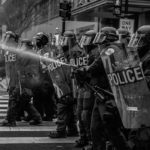Some Interrogations of Custodial Defendants Must be Video Recorded
Defendants charged with serious crimes risk police officers getting creative when recounting a defendant’s statements.

New Video Recording Interrogations Law
A law in Michigan requires video and audio recording interrogations and statements of those arrested for major crimes. Senate Bill 152 was introduced by Sen. Tonya Schuitmaker and signed by Gov. Rick Snyder in December. The law requires: “The recording of interrogations of individuals in custodial detention for felonies punishable by imprisonment for life, any term of years, or 20 or more years.” The law applies to local police departments and the Michigan State Police.
The law further states that this law applies if the law enforcement agency has audiovisual recording equipment that is operational or accessible. Due to a lack of funding, a recording is unavailable in all locales. Currently, the only penalty for not video recording is a jury instruction advising a jury that the law enforcement agency was obligated to record the proceedings.
With the new law in effect, the hope is that there will be fewer incidents of false confessions. Regardless of whether or not video recording is available during interrogation, it is always best to be represented by a Michigan Criminal Attorney.
Is video recording interrogations good for the police or the defendant?
Video and audio recording interrogations are generally good for everyone. It is far more likely that a defense lawyer will be able to discover coercion and threats by law enforcement interrogators if there is a recording of an interview. For the government, so long as they follow the rules, it is far more difficult for a defense lawyer to attack the veracity of a confession if the interrogation is done correctly and recorded. It is essential that a person facing criminal allegations refuses to speak with the police without legal counsel. Invoke your right to remain silent and demand a lawyer. Don’t have a lawyer? It doesn’t matter; demand one anyway. A demand for an attorney will stop the interrogation until the suspect is represented by an attorney. If you are innocent, you should still not talk with the police because anything you say “can and will” be used against you. The police are not looking for the truth; they are building a case. Consult with a lawyer before you do anything.

What To Do If the Police Want to Question You
If the police want to question someone about a crime, the most crucial step is exercising one’s legal rights, particularly the right to remain silent and an attorney. It’s essential to remember that anything said to the police can be used in court, and it’s often best not to answer any questions beyond basic identification information without legal representation present. One should clearly and politely state that they wish to speak to an attorney before answering any questions. This is not an admission of guilt but a prudent exercise of legal rights.
Regarding the request for a video recording of an interrogation, while it’s not a guaranteed right in all cases for the individual being interrogated to demand this, many police departments do record interrogations as a standard practice. This is mainly for the protection of both parties: it helps ensure that the interrogation is conducted correctly and that the rights of the person being questioned are respected. If a video recording is made, discovery can be requested later through legal processes, typically by the defense attorney, as part of the discovery process in preparation for trial. A defendant stands a better chance of persuading a jury that police officers are untruthfully reporting a confession if they requested a video and audio recording of their interrogation and the officers failed to do so.
What are the dangers of police officers failing to video record interrogations?
The failure of police officers to video record interrogations can lead to several significant issues, both for the criminal justice system and for the individuals involved in the process:
- Risk of False Confessions: Without a video record, it’s more challenging to determine if a confession was made voluntarily or due to coercion, pressure, or misunderstanding. This increases the risk of false confessions being admitted into evidence, which can lead to wrongful convictions.
- Difficulty in Assessing the Conduct of the Interrogation: Video recordings provide an objective account of the police interrogation process. Without this, it’s more challenging to scrutinize the methods used by police officers, including whether they followed proper procedures or if they might have inadvertently influenced or pressured the suspect.
- Challenges in Defense Representation: The lack of a video record limits a defense attorney’s ability to challenge the prosecution’s narrative. Identifying inconsistencies or procedural errors that might be crucial in defending their client becomes more difficult.
- Potential for Misinterpretation or Memory Issues: Human memory is fallible, and without a video record, the only accounts of what happened during an interrogation are the recollections of those present. These recollections can be influenced by a police officer’s bias, stress, or simple errors in memory, leading to inaccurate representations of the interrogation.
- Impediments to Judicial Review: Courts rely on comprehensive records to make informed decisions. Without video evidence, judges and juries must rely solely on verbal testimony of the police officer and defendant, which can be less reliable and more subjective.
In light of these issues, Michigan has moved towards mandating the recording of police interrogations, especially in cases involving serious crimes. These recordings are critical for ensuring fairness and accuracy in the criminal justice process.

Michigan Defense Attorneys With Decades of Experience
The criminal defense lawyers with LEWIS & DICKSTEIN, P.L.L.C. have decades of experience successfully defending clients in state and federal courts throughout Michigan. Our lawyers provide the highest caliber of criminal defense in felony and misdemeanor cases. We review every case to determine if our client’s rights have been violated. If the police do not comply with the law requiring video recording interrogations, we will file a motion to suppress any statements the police claim were made by our client while in custody. If you call us for a free consultation, we will take the time to talk with you, answer your questions, and address your concerns. We will find a way to help you.
Call us today at (248) 263-6800 for a free consultation or complete an online Request for Assistance Form. We will contact you promptly and find a way to help you.












